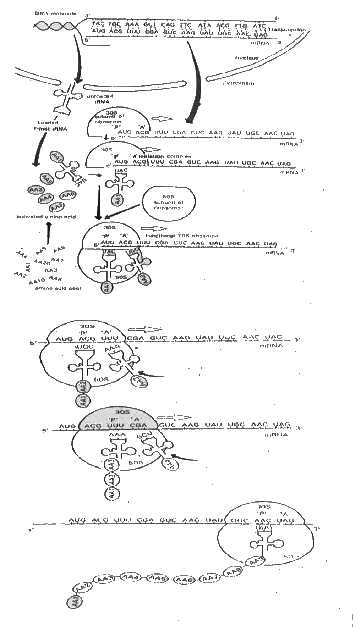Briefly explain the process of Translation during protein synthesis? Solution in Kannada
Translation is the second step during protein synthesis in which using genetic information on mRNA in nucleotide language, protein synthesis takes place on the ribosome in the amino acid lineage. mRNA carrying coded message for the synthesis of protein will be released into cytoplasm. With the help of this mRNA translation occurs in four steps.
They are (1) Activation and selection of amino acids (2) Chain initiation (3 ) Chain elongation
(4) Chain termination.
1. Activation and selection of amino acids: In this step, amino acid combines with ATP in the presence of amino acid synthetase and forms activated amino acid and this process Is known as activation. The activated amino acid thus will be picked up by specific +RNA molecule and form amino acid +RNA.
Amino acid + ATP —» Activated amino acid.
Activated amino acid + +RNA —> Amino acid +RNA
2. Chain initiation: During this process, initially mRNA attaches to the smaller ribosomal Subunit. Then +RNA carrying methionine attaches to the initiator codon (AUG) of mRNA. Now, larger ribosomal subunit attaches to mRNA, such that the +RNA with amino acid coincides at the P-Site. Soon after this, another +RNA with the second amino acid attaches to the A-site and a peptide bond is formed, between the first amino acid occupying A-site. Chain initiation needs ATP and proteins called initiation factors.
3. Chain elongation: Soon after chain initiation, ribosomal subunits slide along mRNA. This shifts the+RNA occupying A-site automatically to the Posited. Now to the emptied A-site, +RNA carrying the third amino acid gets attached. With this, peptide bond is established between second and third amino acids. This results in the growing of polypeptide chain referred to as chain elongation. Chain elongation requires GTP, elongation factors and Mg(+2) ions.
4. Chain termination: As soon as the sliding ribosomal subunits arrive at the terminator codons, the protein synthesis is stopped with the association of releasing factors to the larger subunit of ribosome. This is known as chain termination. Soon after chain termination, the newly formed polypeptide chain undergoes processing and attains a specific structure.

Topper's Solved these Questions
- SUPER MODEL QUESTION PAPER 1Book:SUBHASH PUBLICATIONChapter:SUPER MODEL QUESTION PAPER 1Exercise:PART-D (SECTION-II)
Explore 5 Videos
- SUPER MODEL QUESTION PAPER 1Book:SUBHASH PUBLICATIONChapter:SUPER MODEL QUESTION PAPER 1Exercise:ANSWER THE FOLLOWING QUESTIONS IN ONE WORD OR ONE SENTENCE EACH
Explore 10 Videos
- SUPER MODEL QUESTION PAPER 1Book:SUBHASH PUBLICATIONChapter:SUPER MODEL QUESTION PAPER 1Exercise:PART-C
Explore 7 Videos
- SUPER MODEL QUESTION PAPER (FOR PRACTICE) 3Book:SUBHASH PUBLICATIONChapter:SUPER MODEL QUESTION PAPER (FOR PRACTICE) 3Exercise:PART-D (SECTION-II)
Explore 5 Videos
- SUPER MODEL QUESTION PAPER 2Book:SUBHASH PUBLICATIONChapter:SUPER MODEL QUESTION PAPER 2Exercise:PART D
Explore 11 Videos
Similar Questions
What is bio-magnifaction? Diagramatically represent the process of bio-magnifaction of DDT in an aquatic food chain.
View SolutionDescribe Eutrophication.
View SolutionWrite the difference between insitu and exsitu conservation:
View SolutionDraw the T.S. of mature anther and explain briefly.
View SolutionWrite a neat labelled diagram of T.S of Anther.
View Solutionजीन तथा प्रोटीन-संश्लेषण में क्या सम्बन्ध है? संक्षेप में समझाइये।
View SolutionThe translation step in the process of protein synthesis is made by a charged form of
View SolutionGive the centrol dogma of protein synthesis. Explain the process of translation.
View SolutionRNA synthesis: _______________ :: Protein synthesis: Translation
View Solutionप्रोटीन-संश्लेषण प्रक्रिया को संक्षेप में समझाएँ |
View SolutionBriefly explain the process of Translation during protein synthesis?
View SolutionExplain the process of translation in protein synthesis.
View SolutionTranslation |Protein Synthesis#!#Part 1
View Solutionপ্রোটিন সংশ্লেষের সময়ে DNA থেকে mRNA সংশ্লেষ হওয়ার প্রক্রিয়াকে কী বলে ?
View SolutionTranslation|Protein Synthesis
View Solutionयूकैरियोटिक hn RNA की प्रक्रिया में प्रोटीन संश्लेषण के दौरान टेलिंग की प्रक्रिया में सम्मिलित होता है
View Solution

